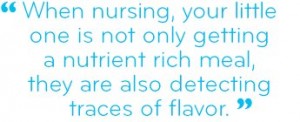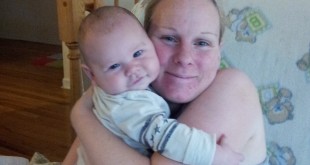 The majority of mothers are aware of the importance of eating nutritious foods while they are expecting a baby. Assuming that you ate an adequate diet while you were pregnant, you can produce plenty of milk for your baby by keeping up this motivation and making sure that you continue your healthy eating patterns during lactation. While you should attempt to eat a “good diet” while you are nursing, you need to be aware that your diet doesn’t have to be perfect in order to support breastfeeding. You can still nurse your baby even if your diet is less than ideal. You may be surprised to learn that studies have shown that maternal nutrition has only a minor effect on the composition and quantity of breastmilk produced. Usually, unless a mother is severely malnourished, her milk is fine. Mothers whose diets are poor deplete their own energy levels, and may become anemic, but their bodies will continue to produce the milk their baby needs by pulling from the mother’s energy stores at her expense, but not her baby’s.
The majority of mothers are aware of the importance of eating nutritious foods while they are expecting a baby. Assuming that you ate an adequate diet while you were pregnant, you can produce plenty of milk for your baby by keeping up this motivation and making sure that you continue your healthy eating patterns during lactation. While you should attempt to eat a “good diet” while you are nursing, you need to be aware that your diet doesn’t have to be perfect in order to support breastfeeding. You can still nurse your baby even if your diet is less than ideal. You may be surprised to learn that studies have shown that maternal nutrition has only a minor effect on the composition and quantity of breastmilk produced. Usually, unless a mother is severely malnourished, her milk is fine. Mothers whose diets are poor deplete their own energy levels, and may become anemic, but their bodies will continue to produce the milk their baby needs by pulling from the mother’s energy stores at her expense, but not her baby’s.
Most women in this country don’t suffer from a lack of food, but rather from eating too much of the wrong kinds. There are no special dietary rules to follow during lactation. If your eating habits are fairly healthy, there is no reason to change them while you are nursing. There are no special foods to avoid, or certain foods that you need to eat (like milk) in order to produce a plentiful supply of nutritious breast milk. With rare exceptions, nursing mothers can eat pretty much anything they want to – including chocolate, broccoli, pizza, and diet soda – in moderation.
Many dietitians and lactation experts feel that one advantage to breastfeeding may be that the milk is flavored by the foods the mother eats, so the baby becomes used to a variety of taste sensations, and tends to have fewer feeding problems as he gets older. One well-known study showed that when mothers ate lots and lots of garlic, their breast milk tasted and smelled like garlic. Not only did the babies who drank the milk not have any digestive problems, but they actually preferred the garlicky milk over the unflavored milk.
Think about it – women in South America who eat lots of peppers, or women in India who eat lots of curry don’t have babies any more colicky or fussy than babies in the U.S. You’ve probably heard that eating “gassy” foods like cabbage, beans, or broccoli will make your baby gassy. That’s one of many “old wives tales”, because gas is produced when bacteria in the intestine interact with the intestinal fiber. Neither gas or fiber can pass into the bloodstream, or into your breast milk, even when your stomach is gassy.
Although it is possible for a baby to be sensitive to a food in his mother’s diet, he is much more likely to react to a food given to him directly. I suspect that most mothers who swear that they can’t eat – pizza, Mexican food, broccoli , cabbage, beans, chocolate, etc. – while they are nursing are actually overreacting to their baby’s normal behavior on any given day. There is a natural tendency for a nursing mother – and everyone around her – to attribute every little thing her baby does to breastfeeding. ALL babies have days when they are gassy, fussy, and spit up, or are just cranky in general. Some babies have sensitive digestive systems, and no matter what you feed them, they will experience outbs of intestinal upsets. The one thing you can be sure of is that there is nothing you can put into a sensitive infant’s stomach that will be easier to digest than breast milk. (See “Spitting Up: Is it Reflux?“)
When you’re nursing, you start to think things like “He’s so gassy today…could it be something I ate? Yep, I had pizza for dinner last night…that must be it. I can’t eat pizza from now on. And I really do love pizza…” When taken to extremes, this sort of thinking can lead to a diet of nothing but boiled chicken and plain white rice.
In over 35 years of experience in working with nursing mothers, I have seen very few cases of food sensitivity that required extensive diet modifications. I’m not saying it doesn’t exist, just that it is not nearly as common as most moms think. It is estimated that only 3-7% of babies will have any type of food sensitivity or allergy, and the majority of these allergies will be mild.
Signs of food sensitivity can include: inconsolable fussiness, suddenly waking in obvious distress, skin rashes, wheezing, and green mucousy stools. Of course, all of these symptoms can be caused by other things besides diet, so that makes it even harder to tell if your baby is reacting to something in your milk, or if the rash or the fussiness is due to something else entirely. If you see a consistent pattern with specific foods, that makes it more likely that your baby may be reacting to something you ate. A strong family history of allergies (food or other) can also increase the possibility of food sensitivity. If you think your baby may be having problems with a food you have eaten, remember that it takes 4-6 hours after ingestion for a food to affect your breastmilk, so that salad or candy bar you just ate is not what’s making your baby fussy. If you really think that something in your milk is upsetting his tummy, try eliminating the food you suspect from your diet for a week or two. Of course, during that time, he may outgrow his sensitivity anyway as his digestive system matures, and you’ll never know whether it was the food causing his symptoms or not. Probably not, but it won’t hurt you or your baby to cut back on certain foods if your diet meets all your nutritional needs without it.
The food that is the most common offender in causing problems with sensitivity and allergies is cow’s milk. It was made for calves, not for human babies, so it doesn’t ‘suit’ his sensitive little digestive system the way mama’s milk does. Cow’s milk is the first food you should work on reducing or eliminating if you suspect your baby has a food sensitivity. It may take 10 days 2 weeks to eliminate cow’s milk protein from your diet, so wait at least 2 weeks before you decide whether cow’s milk is what’s making your baby fussy. Even is your baby can’t tolerate whole milk, he may be able to tolerate milk products, like cheese and yogurt. If he has a reaction to milk and/or milk products when he’s 6 months old, he may be fine with them when he’s 9 or 12 months old, so reintroduce them periodically to see if he has a reaction or not.
The problem with cow’s milk is the protein, which is difficult for babies to digest, and not with the lactose. Human beings are not born lactose intolerant, unless they are born with a rare metabolic disorder. Lactose intolerance is caused by a deficiency of the enzyme lactase, which breaks down lactose (milk sugar) so it can be easily digested. Mammals are born with this enzyme in their intestines. As they grow older and wean, the lactase enzyme decreases. That’s why lactose intolerance rarely shows up in humans before age 3 or 4, since that’s around the natural age of weaning (if that surprises you, check out the article on Weaning.)
 Lactose intolerance is most common in Asian and African adults. The proteins in cow’s milk are primarily caseins, which are harder to digest than whey proteins, which are more prominent in human milk. It’s possible for the proteins in cow’s milk to pass into your breast milk, and can cause digestive problems for your baby. These proteins may even sensitize your baby before birth if you drink lots of milk during your pregnancy. If you decide to reduce or eliminate dairy products, remember than processed milk presents less of a problem than whole milk. You may be able to continue eating yogurt and cheese while cutting back on or eliminating milk. Since milk and milk products are important sources of calcium, be sure that your diet includes calcium from other sources, such as broccoli, nuts, spinach, and canned salmon. Taking a calcium supplement would be a good idea if you are limiting your intake of dairy products. You need about 1,000 mg of calcium a day if you are between 18-50 years of age, whether you are lactating or not. While nursing mothers do lose some bone mass during lactation, by the time your baby has been weaned for a year, this lost bone mass is not only completely restored, but is actually greater than it was before you breastfed your baby. Research has shown that women who breastfeed have half the risk of bone fractures as women who never breastfed. The longer you nurse, the lower the risk. Breastfeeding actually protects you from osteoporosis.
Lactose intolerance is most common in Asian and African adults. The proteins in cow’s milk are primarily caseins, which are harder to digest than whey proteins, which are more prominent in human milk. It’s possible for the proteins in cow’s milk to pass into your breast milk, and can cause digestive problems for your baby. These proteins may even sensitize your baby before birth if you drink lots of milk during your pregnancy. If you decide to reduce or eliminate dairy products, remember than processed milk presents less of a problem than whole milk. You may be able to continue eating yogurt and cheese while cutting back on or eliminating milk. Since milk and milk products are important sources of calcium, be sure that your diet includes calcium from other sources, such as broccoli, nuts, spinach, and canned salmon. Taking a calcium supplement would be a good idea if you are limiting your intake of dairy products. You need about 1,000 mg of calcium a day if you are between 18-50 years of age, whether you are lactating or not. While nursing mothers do lose some bone mass during lactation, by the time your baby has been weaned for a year, this lost bone mass is not only completely restored, but is actually greater than it was before you breastfed your baby. Research has shown that women who breastfeed have half the risk of bone fractures as women who never breastfed. The longer you nurse, the lower the risk. Breastfeeding actually protects you from osteoporosis.
If you are anemic, don’t worry that your milk won’t have enough iron for your baby. Breast milk contains less iron than formula, but the iron is absorbed and used more efficiently, so your baby is less likely to become anemic than a formula fed baby. You may need to take iron supplements to make you feel better, but they will not affect the level of iron in your breast milk.
The guide to how much fluid to drink while nursing is to “drink to thirst”. There is no evidence to show that forcing fluids will increase your milk supply. (Another”old wives tale”.) Drinking too much water (over 12 glasses a day) can actually decrease your milk supply. The problem is that when you are a new mom, you often forget to take care of yourself while you are so immersed in taking care of the baby. Try drinking a glass of water whenever you sit down to nurse. You can also get water from other sources – juice and yes, even soda count…but take it easy on the soda, because it contains a bunch of chemicals and/or sugar that your body doesn’t need. Most mothers find that they are thirstier when they are nursing. If you produce large amounts of pale urine and are not constipated, then you are probably drinking enough. If your stools are hard and dry, and your urine is concentrated and dark, then you may need to increase your fluid intake. Remember that it is normal for your first void of the morning to be darker and more concentrated than at any other time during the day.
A good rule of thumb is to take in 200-500 calories in excess of what you needed to maintain your weight before you were pregnant while you are nursing. Breastfeeding doesn’t make you gain weight – in fact, you use up calories when you nurse, and you may actually shed those extra pounds more quickly while you are nursing. Your body stores up fat during your pregnancy to provide the extra calories needed for milk production. It is easier to lose lower body fat (hips, buns, and thighs) when you are breastfeeding compared to the mom who is formula feeding. (YAY!). Remember to factor in the weight of your breasts when setting your weight loss goals. The ‘average’ mom (remember, the one who doesn’t exist in real life?) – will carry around about 3 extra pounds of breast tissue while she’s lactating. Some more, some less, but don’t expect to lose that weight until after your baby weans.
If you are a vegetarian, you probably already eat a healthier diet and make wiser food choices that those of of who eat meat. Mickey Ds was my home away from home a lot when my kids were younger. We spent half our waking hours in the car, going to and from school, sporting events, and all the million other places that school age kids need to be. I don’t care if I never see Ronald or the Golden Arches again.
Vegetarians and Vegans don’t need to change their diets unless they don’t include any animal protein at all (vegan and macrobiotic diets). Since animal protein is the best source of B12, consider taking a vitamin supplement containing vitamin B12 if you don’t want to consume any animal products. If you don’t eat dairy products, you also need to make sure to get enough calcium. I recommend that every nursing mom continue taking prenatal vitamins for as long as she lactates, just to make sure her nutritional bases are covered.
Just like “drinking to thirst”, you should “eat to hunger” while nursing. Studies have shown that most nursing mothers tend to lose up to one and a half pounds a month for the first 4-6 months after giving birth, and continue to lose weight at a slower rate beyond that time. Moms who breastfeed tend to lose more weight than formula feeding moms, even when bottle feeding moms take in fewer calories than they do. If you want to lose weight – and most of us do – it’s so depressing to still be wearing those old maternity clothes we got so sick of after the baby is born – plan to do it slowly. It’s best not to try to aggressively lose weight during the first couple of months after birth, because during that time your body needs to recover from childbirth. You’re going to be more tired than you think, even if everything goes smoothly and you’re feeling great. Spend this time establishing your milk supply, and resting with your baby. If you want to get out and about, fine – push your baby in the stroller for short walks, carry him in a sling while you putter around the house ( puttering may be all you can accomplish during those early weeks) and that’s just fine. What you should avoid is things like shopping trips to the mall, planning a birthday party for your 5 year old, cleaning the house because your in laws are coming over, and entertaining guests, whether they are friends or family.
Losing weight too quickly (more than one to one and one half pounds per week) isn’t good for you, especially during the early weeks of breastfeeding. Extreme dieting won’t have much effect on your milk supply, but it does deplete your energy levels, and you need as much energy as possible to get through the early weeks of mothering and breastfeeding.
Read Establishing Your Milk Supply to get you off on the right start. You need to rest and enjoy your baby while you both learn to latch and love. Get to know your little one and fall into a rhythm together before you start worrying about your weight. You’re going to be all puffy and squishy bellied for a while, no matter what you do. The skin doesn’t stretch out that far when you’re pregnant and then just snap back in place like a rubber band. It takes time.
Begin your weight loss program slowly when you are breastfeeding. Increase your activity level and eat less fat and sugar, and more fruits and vegetables. Try to take in at least 1,800 calories each day, and definitely no less than 1,500 calories. Even moderate dieting during lactation can help you lose 4-5 pounds each month, but don’t expect to lose much body fat until about 2 weeks postpartum. The weight you lose immediately after birth is mostly fluid loss.
Mothers who breastfeed more frequently lose weight faster than mothers who nurse less often, and mothers who nurse for shorter periods of time tend to lose weight more slowly than mothers who nurse longer. You may get lucky and find that you can eat more than you ever could before and still lose weight while nursing. That was the case with me, but I did find that eating a whole container of Ben and Jerry’s Chunky Monkey before bedtime every night kept me from losing weight as quickly as I would have liked. Go figure.
Despite one highly publicized but very questionable study about exercising during lactation, there is NO evidence that moderate exercise is anything but beneficial for nursing mothers (or anyone else, for that matter.) Plan to exercise after nursing so your breasts won’t be full and uncomfortable. Wear a supportive sports bra, especially if you have large breasts. Drink a glass of water before and immediately after exercising, and drink more in hot weather. If you regularly lift weights or do other exercises involving repetitive arm movement, take it easy at first. If you develop plugged ducts, cut back and start again more slowly.
 Rinse off your sweaty breasts before nursing – some babies don’t like the taste of the salt.
Rinse off your sweaty breasts before nursing – some babies don’t like the taste of the salt.
Take walks with your baby. If you carry him in a sling or backpack, his extra weight will use up even more calories. Weather permitting, go for lots of walks – this counts as exercise and gets you out of the house as well. It the weather keeps you inside, try carrying your little one in a sling while you do housework – and try dancing with him. You may feel silly, but he’ll love it and so will you. Nobody will see you, and postpartum mothers are supposed to act a little bit goofy – the technical term for this is “baby brain”.
In summary: try to eat a nutritious diet while you are nursing, for your sake and your baby’s. Don’t worry if your diet isn’t perfect – your milk will still be fine. If you want to lose weight, you will probably lose it without radically altering your diet while your are nursing. If you want to lose weight faster, start slowly, increase your activity level, and eat nutrient dense and healthy foods. Moderate exercise is good for both you and your baby. Try to make it fun so that you’ll stick with your exercise program.
Eat anything you want to in moderation, and remember that many mothers lose weight while lactating even without modifying their diet or exercise routine.
You will usually keep about 3 pounds of extra tissue in your breasts as long as you are nursing, so factor that into your weight loss goals. Enjoy nursing your baby, eat a healthy diet, and you most likely will lose weight while eating more food than you were used to eating before your little one arrived.
Sources include: Breastfeeding and Human Lactation, 2nd Edition; Riordan and Auerbach, 1999; LLLI The Breastfeeding Answer Book, revised edition, 1997; and The Complete Book of Breastfeeding, 3rd edition; Eiger and Wendkos Olds, 1999
(Edited September, 2013)
Anne Smith, IBCLC
Breastfeeding Basics
*Please ‘Pay it Forward’!*
If you found any of the information in this article, helpful, please consider making a small donation to my favorite cause – Project Pets: Spay, Neuter, Love – an all volunteer, non-profit organization that provides free spay and neuter services for homeless rescue dogs and cats…because every baby deserves a home, whether they have two legs or four! To find out how you can help, visit Project Pets on Facebook.
 Breastfeeding Basics
Breastfeeding Basics






